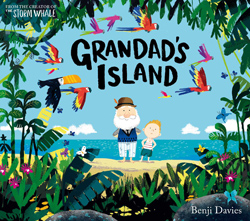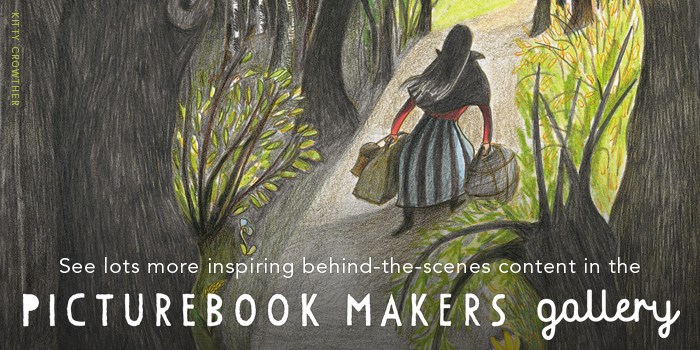< Back to posts
Benji Davies
United Kingdom

Benji Davies is an animation director, illustrator and picturebook maker. He studied animation at college, and has since worked on a wide range of projects – from children’s books, animated short films and apps, to music videos, commercials and title sequences. Benji’s books have been co-editioned in many countries around the world.
In this post, Benji talks about the creation of his excellent new picturebook, ‘Grandad’s Island’, which is shortlisted for the AOI World Illustration Awards 2015. This poignant story tackles the emotional subject of losing a loved one, with subtlety and depth.
Visit Benji Davies's website
Visit Benji Davies's Facebook page
Benji: ‘Grandad’s Island’ is the second picture book I have written. I’ve illustrated several picture books over the past ten years, and a growing stack of novelty books, but my first opportunity to be published as both writer and illustrator was with ‘The Storm Whale’ (how that book came to be is another story).
There had been quite a gap – maybe a year or so – since I had finished working on that book, and it was time for something new. I had a few ideas floating in the background, but nothing fully formed. So I plugged myself into other projects and left my ideas to mingle and percolate on the pages of my sketchbook and in the back of my head.
One idea which had been with me for a while was a story based around this character – a kind of stylised Charles Darwin who was on a zoological expedition to find new species. I imagined him cursing under his breath quite a lot and I realised I had channelled a bit of Raymond Briggs's Father Christmas.
Rather than start again, I decided to pursue an alternative route. But there wasn’t much to grapple with narratively. It was more humour-based and I couldn’t see a story. I started to imagine what would happen if this explorer was accompanied by his grandson on the school holidays. Maybe the boy was bored and they would make up an adventure together. There was something well-worn about this story though, and I couldn’t think of a way around it. It needed an original angle to take it somewhere else. I left it to stew some more.
A key moment came when I saw this image in my head of a great big steam ship sitting snugly in the middle of a row of houses. It felt like a strong image and one that I could build a story around. There was a biblical scale to it – this huge vessel emanating from a mundane setting. It had a fantastical, exciting quality and it further fired my imagination. I think this is something I am always looking for: to chance upon images that inspire me to explore them further. Images that start to tell stories.
I liked the idea of an adventure that both characters would learn something from, but in different ways. Allegorical tales appeal to me – stories that represent a universal truth about being human through metaphorical or fantastical settings and scenarios. I sketched out the characters some more, to see how they would interact, how they might start their journey, what it might be like when they got there. They started telling me something about themselves. There was a faint notion of something unspoken between them – something they weren’t talking about.
The subject of death is by no means unexplored in picture books, but is one that sometimes makes people draw breath. Perhaps that’s what attracted me to it. At some point along the way, I realised that this was going to be my ‘death book’. I’m not sure when this moment came exactly, but when it did, I knew that I had found the core of the story. Perhaps it had been there all along, creeping up on me and the characters.
I knew that Grandad should be vulnerable – that without being heavy-handed about hospitals and illness, I needed to show his weakness. The walking stick is a great symbol and metaphor for old age and perfectly places these attributes on a character. But I wanted to take it further. My great aunt and uncle, who are very elderly, had been experiencing the obsolescence of old age, and it had become very apparent the strains it was having on them mentally and physically. After a stroke and some time in hospital, my uncle, who is in his nineties, returned home. But my aunt was under a lot of stress and she left the house one night in her nightie and dressing gown, went outside and sat on the wall, clutching her handbag. She had never done anything like this before, or shown any signs of ill mental health, and we were all very worried about her. Whilst this was a dramatic story in my family, I also saw something within it that would contribute to Grandad’s character. The combination of nightwear confused with something everyday in the handbag – as if she was just off to the shops in the middle of the night – really summed up the feeling. I put Grandad in stripy pyjama bottoms. Paired with his hat, jumper, and carrying his stick, it did everything I needed it to.
Most of my ideas filter through subconsciously. They just bubble up and become part of a story. Sometimes I spot something, and when I look back I realise where it came from. About eighteen months ago, I moved to the house I live in now. It’s a kind of upside-down house in that the living space is on the top floor, where there is a balcony and a big window with acres of sky and billowing clouds. As you get to the top of the stairs it feels to me a lot like arriving on the top deck of a ship. There is also a flock of green parakeets which fly past the window every evening at sunset. Both these things got under my skin and found their way into the artwork.
I finally pulled all the corners of the story together when I was in Thailand last year. My wife and I went to a remote island in the far south near Malaysia. It was idyllic. My head was full of the hot colours, the bright light sparkling on the sea, the thick vegetation, and I thought, this is the place where Grandad goes. It was distant and tropical and nothing like the little row of houses where he lives. On the last days of the trip, as we travelled back to Bangkok, I wrote the full synopsis in the notes on my phone. Although I had written drafts before, none were complete. This one told the whole story, beginning to end, with everything (almost) in the right place. Once back in London, I set to work laying it out as thumbnails. I knew I had my next book.
I had a good relationship with my grandad throughout my childhood and into my early teens. Although he lived on the other side of the country in Cornwall, we would write to each other often. We made up stories about Fenland sprites and Cornish piskies, and using nom de plumes, we corresponded by carrier-goose (Royal Mail) across the length of the country. He started to write a book about a hare who found a golden egg – a book that I would hopefully illustrate. Time and other factors meant that he would never finish the book and the project never came to fruition.
He had been a primary school headteacher, he was a keen reader and sometimes he would paint and draw. He loved books about history and fossils and nature. We would read non-fiction books together when he stayed at our house. In particular, I remember one about British birds, which we read from cover to cover, both fascinated by all the different species, their migratory habits and winter plumage. He died when I was fifteen and I never got to speak to him as an adult – something I wish I could do now. But when I look back, I realise how amazing it was to send these letters to each other; how wonderful that we got to do that, with our shared interest in wildlife and making things up.
(Note the blue parrot on my jumper!)
Those memories resonate across the years and there is a kind of communication there between us that still exists, crystallised in time. So I weaved some of this into the story too. The concept of a letter passing between these impossibly distant places in the story seemed the perfect ending to express this idea. One of the things I think it does is to create hope for the reader. There is a comfort that maybe, somehow, this line of communication is still present, even if it’s in the imagination or stored in the memory. Even though Grandad has gone, Syd has all these memories and happiness to look back upon, just by looking at his grandad’s paintings and remembering what they shared together, much as I have with my grandad. There is also an openness to this ending, and I would urge the reader to think positively about what has happened in the story and imagine what lies beyond the final page of the book.
Illustrations © Benji Davies. TRAILER: Animation by Beakus | Music and sound by Resonate.
Grandad's Island
Benji Davies
Simon & Schuster, United Kingdom, 2015
After the phenomenal success of ‘The Storm Whale’ and ‘On Sudden Hill’, this new picturebook by Benji Davies deals with the emotional topic of losing a grandparent.
Subtly told, this beautifully illustrated story tackles a difficult subject with great sensitivity and depth.
- English: Simon & Schuster
- German: Aladin Verlag
- French: Éditions Milan
- Spanish: Andana Editorial (Spain) – Educaria Zig Zag (Latin America)
- Hindi: Full Circle
- Swedish: Hippo Bokförlag (2016)
- Catalan: Andana Editorial
- Greek: Ikaros Publishing
- Chinese (Simplified): Children's Fun Publishing / Egmont
- Russian: Polyandria
- Slovenian: Zalozba Zala















